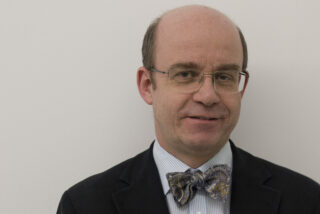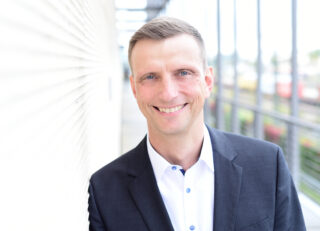Read next
IKS development project
Establishing trust in artificial intelligence
Safe intelligence is the central research topic of the Fraunhofer Institute for Cognitive Systems IKS. This topic is very important from a technology perspective as well as with regard to the economy and society. The two Chairs of the Advisory Board for the IKS development project see it the same way — each from their own perspective.



© iStock.com/Orbon-Alija
Prof. Thomas Seidl, Deputy Chair of the IKS Project Advisory Board, takes a scientist’s point of view, exactly what one would expect from the Chair for Database Systems and Data Mining at Ludwig-Maximilians-Universität (LMU) Munich. For him, safe intelligence is first and foremost about combining the topic of safe software systems with questions about artificial intelligence (AI). “Calling it a clash of cultures, like with the Egyptians and ancient Greeks, is surely exaggerated,” says Seidl.

Prof. Thomas Seidl is the Chair for Database Systems and Data Mining at Ludwig-Maximilians-Universität (LMU) Munich. He is spokesperson of the Munich Center for Machine Learning (MCML), the national AI competence center, and a member of the Board of Directors of the Leibniz Supercomputing Center (LRZ), and the elite Data Science study program, several scientific advisory boards and numerous program committees. After studying computer science at TU Munich, Seidel earned his PhD and postdoctoral qualification at LMU, to which he returned in 2016 after working at the University of Konstanz and RWTH Aachen University.
“But software engineers have an entirely different type of safety requirements than is the case with machine learning, where many statistical observations are incorporated.” Fraunhofer IKS can make an important contribution to finding out how “the peculiarities of cognitive systems can be rendered tangible with this machine learning and captured in the conceptuality and classification of safe software systems.”
In contrast, Thomas Gallner, Chair of the IKS Project Advisory Board, examines safe intelligence from a business perspective. For the Head of Innovation Center and Technology Scouting at CARIAD, a Volkswagen Group company, the term “Trust” is paramount. “Ultimately, it’s about creating trust in the topic of AI in industry,” emphasizes Gallner, and gives an example: “When a vehicle that is equipped with a variety of sensors is moving at level 4 of automated driving, there can never be an event where you say afterwards, ‘I don’t know why the system reacted like that either.’” What’s more, these new systems have to be better and more powerful than today’s systems. The research work of Fraunhofer IKS in the area of safe intelligence is highly relevant in this context.

Thomas Gallner is Head of Innovation Center and Technology Scouting at CARIAD, a Volkswagen Group company. He has lectured on Innovation Management at OTH Regensburg since 2019. Prior to this, Gallner worked at Continental for nearly 13 years, most recently as Head of Corporate Innovation Management. His career also includes stints at Siemens and Infineon, among others. He earned his master’s degree in Microsystems Engineering at OTH Regensburg in 1995.
This trust is a prerequisite for Fraunhofer IKS — like the Fraunhofer-Gesellschaft overall — to fulfill its mission, namely building a bridge between basic research and application, says Seidl. “In other words, it’s about getting the results of research into the field, in cooperation with small and large industrial partners.” At Fraunhofer IKS, this applies most of all to AI-based applications in safety-critical areas, which are few and far between so far, reports Seidl. “People are justifiably very cautious here and there is a large demand for research.”
Gallner’s opinion is similar: In Europe, it’s about transferring the results of research to applications, getting them “on the road”. This involves using and pooling existing expertise just as much as establishing closer ties with businesses and society at large. “Our goal must be to define focal topics in the framework of regional excellence initiatives and take a leading role internationally. Fraunhofer IKS can play an important role here.”
All the same, says Seidl, we must not lose sight of the role of the scientist, despite the high demands in the projects, the deadlines, the expectations of the project partners, and other factors. Seidel is quite conscious of this, however: “The perspective of science is that of critical analysis and ‘getting to the bottom of things’,” explains Seidl. “Repeatedly asking yourself the question: What am I really doing here? That’s what I’d like to convey to the research fellows at Fraunhofer IKS.”
The Project Advisory Board was dissolved in October 2023. For more information on the IKS establishment project, please visit our website: Establishment of the Fraunhofer Institute for Cognitive Systems IKS
This work was funded by the Bavarian Ministry for Economic Affairs, Regional Development and Energy as part of a project to support the thematic development of the Institute for Cognitive Systems.


